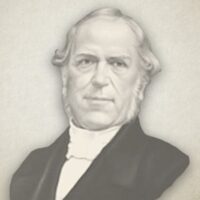
28 Did Christ Die For All Sin, Not Persons In Particular?
It has been said, `That Christ died for sin, for all sin, and not for persons in particular.’ This is a very convenient loop-hole for the bringing in of universal invitations, and human conditions for the personal acquirement of eternal life; but is this the truth of God that endureth for ever? Death is the wages of sin, and if Christ died for all sin, then is there now no more death for sin to any one. Death is the full penalty of sin, and so much of sin as Christ hath died for, so much of death that came by sin hath Christ for ever destroyed. And if Christ died for all sin, then hath he for ever abolished, swallowed up in victory, and destroyed all death, that came by sin, or by dying he hath not destroyed death at all, and in that case what has he done by dying? But according to the truth of the word of God, so far as Christ hath died for sin, so far death that came by sin, and is the wages and penalty of sin, is destroyed, so as to have no more power or existence in relation to the sin for which Christ died; and as far as sin was condemned in the flesh of Christ, so far is condemnation for ever ended on the sin for which Christ died, Rom viii 1,3. For wherein Christ by dying for sin is death’s destruction, there, and to that full extent, is he life’s sure, full and happy fountain for ever, John xi 25,26; and to this truth the Holy Ghost leads the convinced heirs of salvation for the hope of eternal life, and to realize, by humble persuasion under his divine testimony, that on the ground of this truth, `the law of the Spirit of life in Christ Jesus hath made and doth make them free from the law of sin and death,’ Rom viii 2; with the happy, `Who is he that condemneth? It is Christ that died,’ verse 34. Sin is called a debt, and that Christ should pay off that debt by dying, without an immediate regard to the debtor, appears to me most senseless. Sin is an offence, and that Christ should suffer death, which is the utmost penalty for the offence, without an immediate regard to the offender, and his sure escape too, appears to me to be anything but divine truth, reason or common sense; because we might just as well say, that Christ died to pay debts and to suffer penalties without any regard whatever to either debtor or creditor, offender or offended; or without any real design.
John Foreman (1792-1872) was a Strict and Particular Baptist preacher. He was appointed the Pastor of Hill Street Chapel, Marylebone, serving this position for close to forty years.
JOHN FOREMAN'S LIFE AND MINISTRY
JOHN FOREMAN ON DUTY FAITH (COMPLETE)
JOHN FOREMAN'S BAPTISM AND COMMUNION CONSIDERED (COMPLETE)




